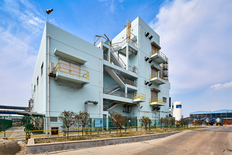- BASF's new plant in Ludwigshafen will start operations by 2027.
- The investment is in a high double-digit million-euro range.
- The plant will produce semiconductor-grade sulfuric acid.
- The expansion supports Europe's growing chip manufacturing demand.

Investment and Timeline
BASF is set to expand its production capacity for semiconductor-grade sulfuric acid at its Ludwigshafen site in Germany. The new facility, featuring advanced purity capabilities, is expected to begin operations by 2027. The investment is in a high double-digit million-euro range, aligning with the capacity expansion of key customers in the semiconductor industry.
Market Demand
The expansion is driven by the increasing demand for high-quality and high-purity semiconductor-grade chemicals in Europe. This demand is fueled by the construction and expansion of several new chip manufacturing plants across the continent. A close cooperation partner of BASF is currently building a new chip production plant in Europe, further accelerating the need for these chemicals.
Supply Chain Reliability
The new plant will enhance supply chain reliability for BASF’s partners by ensuring a consistent and dependable supply of high-quality semiconductor-grade sulfuric acid. The local production at Ludwigshafen will allow BASF to better meet customer needs, providing prompt support and minimizing lead times.
Strategic Importance
Located at the heart of BASF’s integrated chemical production site, the state-of-the-art facility will be backed by rigorous quality control measures. This strategic move underscores BASF’s commitment to supporting the growth of the advanced semiconductor industry in Europe, leveraging the Ludwigshafen Verbund site to meet the evolving needs of the market.

